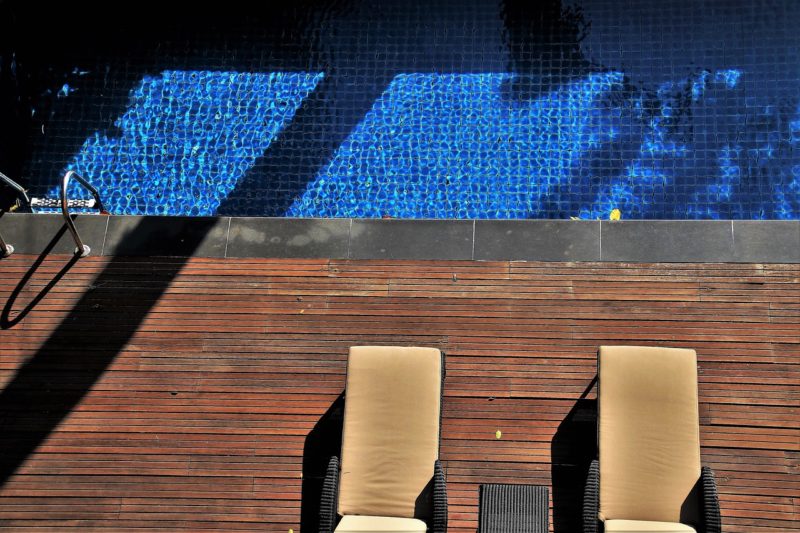What Are the Benefits of a Saltwater Pool?

The surge in popularity of saltwater pools has been remarkable over the past two decades. Despite this growth, there remains a widespread lack of understanding about their mechanisms and why they’re increasingly favored by pool owners.
To grasp the benefits of chlorine generated by saltwater in pools and its role in enhancing your pool experience while ensuring safety, it’s vital to comprehend the fundamental distinctions between saltwater pools and their traditional counterparts.
How Traditional Chlorinated Pools Function
In conventional swimming pools, the water is treated using chlorine tablets, liquid chlorine, and assorted chemicals. Upon introduction into the water, these substances break down into compounds such as hypochlorous acid. These chemicals effectively eliminate bacteria, rendering the water safe for swimming.
Yet, maintaining the appropriate chemical balance requires continuous monitoring and the periodic addition of extra chemicals. Inadequate management of chlorine levels in such pools can lead to increased bacteria and algae proliferation, necessitating extensive cleaning and the use of supplementary chemicals.
While properly tended to, traditionally chlorinated pools are safe for swimming, their upkeep can be intricate and demand consistent management to ensure safe swimming conditions.
Saltwater Pool Mechanics
A prevalent misconception surrounding saltwater pools is the belief that they lack chlorine altogether due to the absence of added chlorine. However, the salt system within these pools is responsible for generating the necessary chlorine to maintain a safe swimming environment.
Saltwater pools operate via electrolysis. Water flows through a salt cell where a minor electrical charge is applied, causing the breakdown of salt components (sodium and chlorine). Consequently, chlorine becomes available to eradicate bacteria in the water. Upon completing its sanitizing task, chlorine reunites with sodium, initiating the cycle anew.
Due to this continuous process, maintaining consistent chlorine levels becomes more manageable. Thus, saltwater pools, albeit using chlorine to combat bacteria and algae and ensure safe swimming conditions, do so in a less overt manner than traditional chlorinated pools.
Saltwater Pool Benefits
Opting for a saltwater pool over a traditionally chlorinated one comes with numerous benefits that cater to convenience, cost efficiency, and a more enjoyable swimming experience.
Reduced Maintenance
Saltwater pools operate by consistently maintaining chlorine levels, significantly reducing the likelihood of algae growth and bacterial infestations in the water.
Typically, a well-functioning saltwater system might necessitate only seasonal cleaning. While regular monitoring of water levels remains crucial to ensure balanced levels, the need for extensive maintenance tasks is drastically minimized or completely eradicated.
Fewer Chemicals
Due to their reliance on a salt system, saltwater pools eliminate the need to store potentially hazardous chemicals like liquid chlorine. This setup ensures water safety with notably fewer chemicals compared to traditional pools, offering a safer and more environmentally friendly swimming environment.
Cost-Effectiveness
Despite the initial higher investment required for setting up a saltwater pool system, the long-term operational costs can be significantly lower than those of traditional pools. Continuous chlorination by the salt system helps maintain stable water levels over extended periods, reducing the need for frequent adjustments.
Moreover, the absence of constant purchases and additions of chlorine contributes to cost savings over time.
Softer Water Experience
Another notable benefit of saltwater pools is the sensation of the water. Many swimmers report that the water feels softer and silkier compared to traditional pool water.
This improved feeling is attributed to the presence of salt, albeit at much lower concentrations than seawater. With saltwater pools typically containing around 3,000 ppm of salt compared to the ocean’s 35,000 ppm, the result is water that aids skin in retaining moisture, offering a more luxurious swimming experience.
Safety through Saltwater Systems
Choosing a saltwater pool offers more than just a different swimming experience; it provides a safe environment through a straightforward chemical reaction. The saltwater system ensures pool safety by continuously working to eliminate bacteria and hazards, requiring minimal manual intervention. This approach simplifies the maintenance process, saving both time and money in the long run.
By adopting a saltwater chlorination system, you’re making a wise choice for maintaining a safe swimming environment. Eliminating the hassles of manual chlorination, the system guarantees consistent water sanitization. As long as salt is added to the system, the continuous chlorination process ensures water safety without the concerns associated with manual chlorine additions.
Conclusion
Transitioning to a saltwater pool system not only guarantees a worry-free approach to water safety but also eliminates the necessity for perpetual monitoring of pool water quality. The consistent and dependable chlorination process offers peace of mind, rendering the shift to a saltwater pool an enticing option for homeowners aiming for a safer, more cost-effective, and pleasurable swimming experience enriched by the array of saltwater pool benefits.
Would you like to receive similar articles by email?





